- Home
- Roger Zelazny
Frost and Fire Page 2
Frost and Fire Read online
Page 2
The music rises in volume, as if competing with the blast of the wind, the rattle of the icy flakes. Across the room the videoscreen comes on of its own accord.
The face. The same face. Just for an instant. He is certain. And then channelless static, wavy lines. Snow. He chuckles.
All right, play it that way, nerves, he thinks. You’ve every reason. But the trank’s coming to get you now. Better have your fun quick. You’re about to be shut down.
The videoscreen cuts into a porn show.
Smiling, the woman mounts the man …
The picture switches to a voiceless commentator on something or other.
He will survive. He is a survivor. He, Paul Plaige, has done risky things before and has always made it through. It is just that having Dorothy along creates a kind of deja vu that he finds unsettling. No matter.
She is waiting for him in the bar. Let her wait. A few drinks will make her easier to persuade—unless they make her bitchy. That sometimes happens, too. Either way, he has to talk her out of the thing.
Silence. The wind stops. The scratching ceases. The music is gone.
The whirring. The window screens dilate upon the empty city.
Silence, under totally overcast skies. Mountains of ice ringing the place. Nothing moving. Even the video has gone dead.
He recoils at the sudden flash from a peripheral unit far to his left across the city. The laser beam hits a key point on the glacier, and its face falls away.
Moments later he hears the hollow, booming sound of the crashing ice. A powdery storm has risen like surf at the ice mount’s foot. He smiles at the power, the timing, the display. Andrew Aldon … always on the job, dueling with the elements, stalemating nature herself, immortal guardian of Playpoint. At least Aldon never malfunctions.
The silence comes again. As he watches the risen snows settle he feels the tranquilizer beginning to work. It will be good not to have to worry about money again. The past two years have taken a lot out of him. Seeing all of his investments fail in the Big Washout—that was when his nerves had first begun to act up. He has grown softer than he was a century ago—a young, rawboned soldier of fortune then, out to make his bundle and enjoy it. And he had. Now he has to do it again, though this time will be easier—except for Dorothy.
He thinks of her. A century younger than himself, still in her twenties, sometimes reckless, used to all of the good things in life. There is something vulnerable about Dorothy, times when she lapses into such a strong dependence that he feels oddly moved. Other times, it just irritates the hell out of him. Perhaps this is the closest he can come to love now, an occasional ambivalent response to being needed. But of course she is loaded. That breeds a certain measure of necessary courtesy. Until he can make his own bundle again, anyway. But none of these things are the reason he has to keep her from accompanying him on his journey. It goes beyond love or money. It is survival.
The laser flashes again, this time to the right. He waits for the crash.
THE STATUE. It is not a pretty pose. She lies frosted in an ice cave, looking like one of Rodin’s less comfortable figures, partly propped on her left side, right elbow raised above her head, hand hanging near her face, shoulders against the wall, left leg completely buried.
She has on a gray parka, the hood slipped back to reveal twisted strands of dark blond hair; and she wears blue trousers; there is a black boot on the one foot that is visible.
She is coated with ice, and within the much-refracted light of the cave what can be seen of her features is not unpleasant but not strikingly attractive either. She looks to be in her twenties.
There are a number of fracture lines within the cave’s walls and floor. Overhead, countless icicles hang like stalactites, sparkling jewellike in the much-bounced light. The grotto has a stepped slope to it with the statue at its higher end, giving to the place a vaguely shrinelike appearance.
On those occasions when the cloud cover is broken at sundown, a reddish light is cast about her figure.
She has actually moved in the course of a century— a few inches, from a general shifting of the ice. Tricks of the light make her seem to move more frequently, however.
The entire tableau might give the impression that this is merely a pathetic woman who had been trapped and frozen to death here, rather than the statue of the living goddess in the place where it all began.
THE WOMAN. She sits in the bar beside a window. The patio outside is gray and angular and drifted with snow; the flowerbeds are filled with dead plants—stiff, flattened, and frozen. She does not mind the view. Far from it. Winter is a season of death and cold, and she likes being reminded of it. She enjoys the prospect of pitting herself against its frigid and very visible fangs. A faint flash of light passes over the patio, followed by a distant roaring sound. She sips her drink and licks her lips and listens to the soft music that fills the air.
She is alone. The bartender and all of the other help here are of the mechanical variety. If anyone other than Paul were to walk in, she would probably scream. They are the only people in the hotel during this long off-season. Except for the sleepers, they are the only people in all of Playpoint.
And Paul … He will be along soon to take her to the dining room. There they can summon holo-ghosts to people the other tables if they wish. She does not wish. She likes being alone with Paul at a time like this, on the eve of a great adventure.
He will tell her his plans over coffee, and perhaps even this afternoon they might obtain the necessary equipment to begin the exploration for that which would put him on his feet again financially, return to him his self-respect. It will of course be dangerous and very rewarding. She finishes her drink, rises, and crosses to the bar for another.
And Paul … She had really caught a falling star, a swashbuckler on the way down, a man with a glamorous past just balanced on the brink of ruin. The teetering had already begun when they had met two years before, which had made it even more exciting. Of course, he needed a woman like her to lean upon at such a time. It wasn’t just her money. She could never believe the things her late parents had said about him. No, he does care for her. He is strangely vulnerable and dependent.
She wants to turn him back into the man he once must have been, and then of course that man will need her, too. The thing he had been—that is what she needs most of all—a man who can reach up and bat the moon away. He must have been like that long ago.
She tastes her second drink.
The son of a bitch had better hurry, though. She is getting hungry.
THE CITY. Playpoint is located on the world known as Balfrost, atop a high peninsula that slopes down to a now-frozen sea. Playpoint contains all of the facilities for an adult playground, and it is one of the more popular resorts in this sector of the galaxy from late spring through early autumn—approximately fifty Earth years. Then winter comes on like a period of glaciation, and everybody goes away for half a century—or half a year, depending on how one regards such matters. During this time Playpoint is given into the care of its automated defense and maintenance routine. This is a self-repairing system, directed toward cleaning, plowing, thawing, melting, warming everything in need of such care, as well as directly combating the encroaching ice and snow. And all of these functions are done under the supervision of a well-protected central computer that also studies the weather and climate patterns, anticipating as well as reacting.
This system has worked successfully for many centuries, delivering Playpoint over to spring and pleasure in reasonably good condition at the end of each long winter.
There are mountains behind Playpoint, water (or ice, depending on the season) on three sides, weather and navigation satellites high above. In a bunker beneath the administration building is a pair of sleepers—generally a man and a woman—who awaken once every year or so to physically inspect the maintenance system’s operations and to deal with any special situations that might have arisen. An alarm may arouse them for emergencies at an
y time. They are well paid, and over the years they have proven worth the investment. The central computer has at its disposal explosives and lasers as well as a great variety of robots. Usually it keeps a little ahead of the game, and it seldom falls behind for long.
At the moment, things are about even because the weather has been particularly nasty recently.
Zzzzt! Another block of ice has become a puddle.
Zzzzt! The puddle has been evaporated. The molecules climb toward a place where they can get together and return as snow.
The glaciers shuffle their feet, edge forward.
Zzzzt! Their gain has become a loss.
Andrew Aldon knows exactly what he is doing.
CONVERSATIONS. The waiter, needing lubrication, rolls off after having served them, passing through a pair of swinging doors.
She giggles. “Wobbly,” she says.
“Old World charm,” he agrees, trying and failing to catch her eye as he smiles.
“You have everything worked out?” she asks after they have begun eating.
PERMAFROST
“Sort of,” he says, smiling again.
“Is that a yes or a no?”
“Both. I need more information. I want to go and check things over first. Then I can figure the best course of action.”
“I note your use of the singular pronoun,” she says steadily, meeting his gaze at last.
His smile freezes and fades.
“I was referring to only a little preliminary scouting,” he says softly.
“No,” she says. “We. Even for a little preliminary scouting.”
He sighs and sets down his fork.
“This will have very little to do with anything to come later,” he begins. “Things have changed a lot. I’ll have to locate a new route. This will just be dull work and no fun.”
“I didn’t come along for fun,” she replies. “We were going to share everything, remember? That includes boredom, danger, and anything else. That was the understanding when I agreed to pay our way.”
“I’d a feeling it would come to that,” he says, after a moment.
“Come to it? It’s always been there. That was our agreement.”
He raises his goblet and sips the wine.
“Of course. I’m not trying to rewrite history. It’s just that things would go faster if I could do some of the initial looking around myself. I can move more quickly alone.”
“What’s the hurry?” she says. “A few days this way or that. I’m in pretty good shape. I won’t slow you down all that much.”
“I’d the impression you didn’t particularly like it here. I just wanted to hurry things up so we could get the hell out.”
“That’s very considerate,” she says, beginning to eat again. “But that’s my problem, isn’t it?” She looks up at him. “Unless there’s some other reason you don’t want me along?”
He drops his gaze quickly, picks up his fork. “Don’t be silly.”
She smiles. “Then that’s settled. I’ll go with you this afternoon to look for the trail.”
The music stops, to be succeeded by a sound as of the clearing of a throat. Then, “Excuse me for what may seem like eavesdropping,” comes a deep, masculine voice. “It is actually only a part of a simple monitoring function I keep in effect—”
“Aldon!” Paul exclaims.
“At your service, Mr. Plaige, more or less. I choose to make my presence known only because I did indeed overhear you, and the matter of your safety overrides the good manners that would otherwise dictate reticence. I’ve been receiving reports that indicate we could be hit by some extremely bad weather this afternoon. So if you were planning an extended sojourn outside, I would recommend you postpone it.”
“Oh,” Dorothy says.
“Thanks,” Paul says.
“‘I shall now absent myself. Enjoy your meal and your stay.”
The music returns.
“Aldon?” Paul asks.
There is no reply.
“Looks as if we do it tomorrow or later.”
“Yes,” Paul agrees, and he is smiling his first relaxed smile of the day. And thinking fast.
THE WORLD. Life on Balfirost proceeds in peculiar cycles. There are great migrations of animal life and quasi-animal life to the equatorial regions during the long winter. Life in the depths of the seas goes on. And the permafrost vibrates with its own style of life.
The permafrost. Throughout the winter and on through the spring the permafrost lives at its peak. It is laced with mycelia—twining, probing, touching, knotting themselves into ganglia, reaching out to infiltrate other systems. It girds the globe, vibrating like a collective unconscious throughout the winter. In the spring it sends up stalks which develop gray, flowerlike appendages for a few days. These blooms then collapse to reveal dark pods which subsequently burst with small, popping sounds, releasing clouds of sparkling spores that the winds bear just about everywhere. These are extremely hardy, like the mycelia they will one day become.
The heat of summer finally works its way down into the permafrost, and the strands doze their way into a long period of quiescence. When the cold returns, they are roused, spores send forth new filaments that repair old damages, create new synapses. A current begins to flow. The life of summer is like a fading dream. For eons this had been the way of things upon Balfrost, within Balfrost. Then the goddess decreed otherwise. Winter’s queen spread her hands, and there came a change.
THE SLEEPERS. Paul makes his way through swirling flakes to the administration building. It has been a simpler matter than he had anticipated, persuading Dorothy to use the sleep-induction unit to be well rested for the morrow. He had pretended to use the other unit himself, resisting its blandishments until he was certain she was asleep and he could slip off undetected.
He lets himself into the vaultlike building, takes all of the old familiar turns, makes his way down a low ramp. The room is unlocked and a bit chilly, but he begins to perspire when he enters. The two cold lockers are in operation. He checks their monitoring systems and sees that everything is in order.
All right, go! Borrow the equipment now. They won’t be using it.
He hesitates.
He draws nearer and looks down through the view plates at the faces of the sleepers. No resemblance, thank God. He realizes then that he is trembling. He backs away, turns, and flees toward the storage area.
Later, in a yellow snowslider, carrying special equipment, he heads inland.
As he drives, the snow ceases falling and the winds die down. He smiles. The snows sparkle before him, and landmarks do not seem all that unfamiliar. Good omens, at last.
Then something crosses his path, turns, halts, and faces him.
ANDREW ALDON. Andrew Aldon, once a man of considerable integrity and resource, had on his deathbed opted for continued existence as a computer program, the enchanted loom of his mind shuttling and weaving thereafter as central processing’s judgmental program in the great guardian computerplex at Playpoint. And there he functions as a program of considerable integrity and resource. He maintains the city, and he fights the elements. He does not merely respond to pressure, but he anticipates structural and functional needs; he generally outguesses the weather. Like the professional soldier he once had been, he keeps himself in a state of constant alert—not really difficult considering the resources available to him. He is seldom wrong, always competent, and sometimes brilliant. Occasionally he resents his fleshless state. Occasionally he feels lonely.
This afternoon he is puzzled by the sudden veering off of the storm he had anticipated and by the spell of clement weather that has followed this meterological quirk. His mathematics were elegant, but the weather was not. It seems peculiar that this should come at a time of so many other little irregularities, such as unusual ice adjustments, equipment glitches, and the peculiar behavior of machinery in the one occupied room of the hotel—a room troublesomely tenanted by a non grata ghost from the past.
&n
bsp; So he watches for a time. He is ready to intervene when Paul enters the administration building and goes to the bunkers. But Paul does nothing that might bring harm to the sleepers. His curiosity is dominant when Paul draws equipment. He continues to watch. This is because in his judgment, Paul bears watching.
Aldon decides to act only when he detects a development that runs counter to anything in his experience. He sends one of his mobile units to intercept Paul as the man heads out of town. It catches up with him at a bending of the way and slides into his path with one appendage upraised.
“Stop!” Aldon calls through the speaker.
Paul brakes his vehicle and sits for a moment regarding the machine.
Then he smiles faintly. “I assume you have good reason for interfering with a guest’s freedom of movement.”
“Your safety takes precedence.”
“I am perfectly safe.”
“At the moment.”
“What do you mean?”
“This weather pattern has suddenly become more than a little unusual. You seem to occupy a drifting island of calm while a storm rages about you.”
“So I’ll take advantage of it now and face the consequences later, if need be.”
“It is your choice. I wanted it to be an informed one, however.”
“All right. You’ve informed me. Now get out of my way.”
“In a moment. You departed under rather unusual circumstances the last time you were here—in breach of your contract.”
“Check your legal bank if you’ve got one. The statute’s run for prosecuting me on that.”
“There are some things on which there is no statute of limitations.”
“What do you mean by that? I turned in a report on what happened that day.”
“One which—conveniently—could not be verified. You were arguing that day …”
“We always argued. That’s just the way we were. If you have something to say about it, say it.”
“No, I have nothing more to say about it. My only intention is to caution you—”
“Okay, I’m cautioned.”
“To caution you in more ways than the obvious.”

 Seven Tales in Amber
Seven Tales in Amber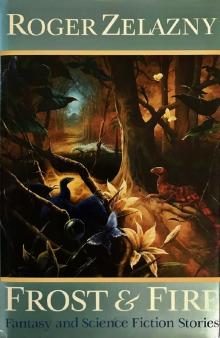 Frost and Fire
Frost and Fire Doorways in the Sand
Doorways in the Sand Unicorn Variation
Unicorn Variation A Night in the Lonesome October
A Night in the Lonesome October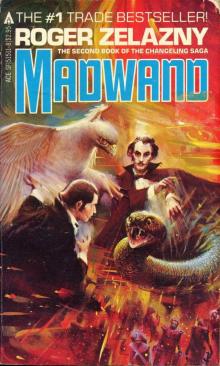 Madwand
Madwand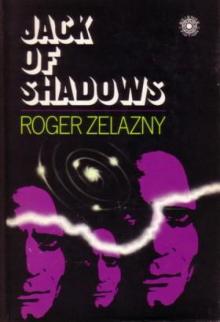 Jack Of Shadows
Jack Of Shadows Lord of Light
Lord of Light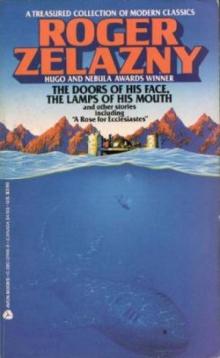 The Doors of His Face, The Lamps of His Mouth and Other Stories
The Doors of His Face, The Lamps of His Mouth and Other Stories Guns Of Avalon tcoa-2
Guns Of Avalon tcoa-2 Coils
Coils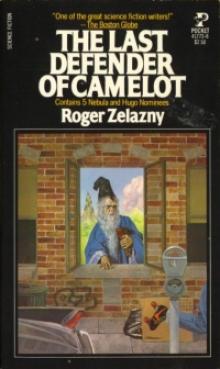 The Last Defender Of Camelot
The Last Defender Of Camelot Creatures of Light and Darkness
Creatures of Light and Darkness This Immortal
This Immortal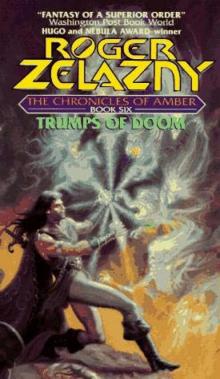 Trumps of doom tcoa-6
Trumps of doom tcoa-6 The Dream Master
The Dream Master The Complete Dilvish, The Damned
The Complete Dilvish, The Damned Nine Princes in Amber
Nine Princes in Amber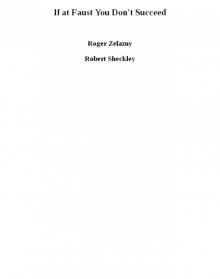 If at Faust You Don't Succeed
If at Faust You Don't Succeed Here there be dragons
Here there be dragons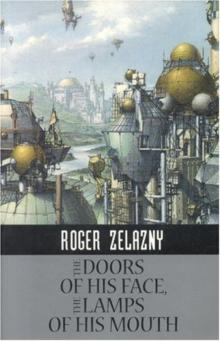 The Doors Of His Face, The Lamps Of His Mouth
The Doors Of His Face, The Lamps Of His Mouth The Great Book of Amber - Chronicles 1-10
The Great Book of Amber - Chronicles 1-10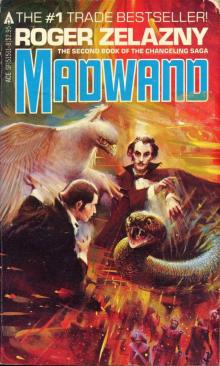 Madwand (Illustrated)
Madwand (Illustrated)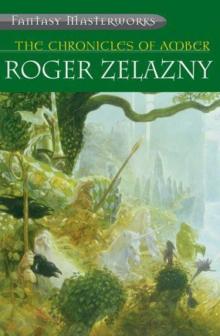 The Chronicles of Amber
The Chronicles of Amber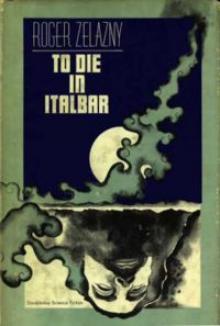 To Die In Italbar
To Die In Italbar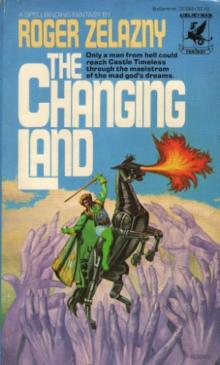 The Changing Land
The Changing Land The Furies
The Furies Nine Princes In Amber tcoa-1
Nine Princes In Amber tcoa-1 Last Of The Wild Ones
Last Of The Wild Ones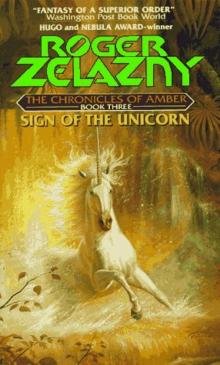 Sign of the Unicorn tcoa-3
Sign of the Unicorn tcoa-3 My Name is Legion
My Name is Legion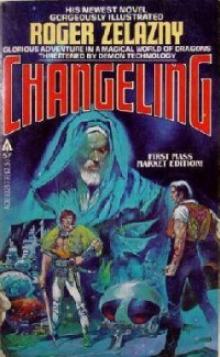 Wizard World 1: Changeling
Wizard World 1: Changeling Changeling
Changeling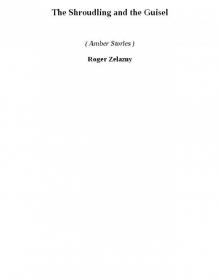 The Shroudling and the Guisel (amber stories)
The Shroudling and the Guisel (amber stories)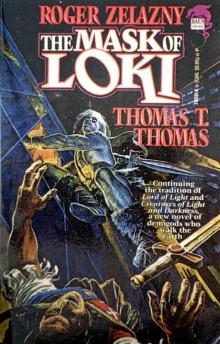 The Mask of Loki
The Mask of Loki A Farce To Be Reckoned With
A Farce To Be Reckoned With Roadmarks
Roadmarks When Pussywillows Last in the Catyard Bloomed (rtf)
When Pussywillows Last in the Catyard Bloomed (rtf) Hall of Mirrors (amber stories)
Hall of Mirrors (amber stories) Permafrost
Permafrost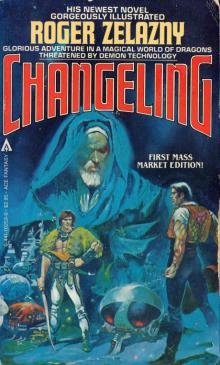 Changeling (Illustrated)
Changeling (Illustrated) Donnerjack
Donnerjack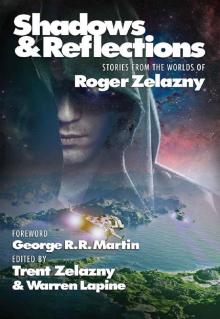 Shadows & Reflections: A Roger Zelazny Tribute Anthology
Shadows & Reflections: A Roger Zelazny Tribute Anthology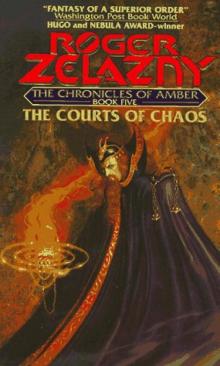 The Courts Of Chaos tcoa-5
The Courts Of Chaos tcoa-5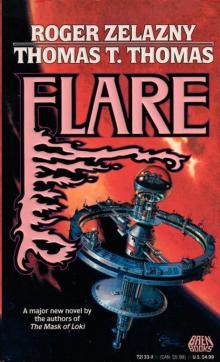 Flare
Flare Doorsways in the Sand
Doorsways in the Sand The Great Book of Amber
The Great Book of Amber Home Is the Hangman
Home Is the Hangman For a Breath I Tarry
For a Breath I Tarry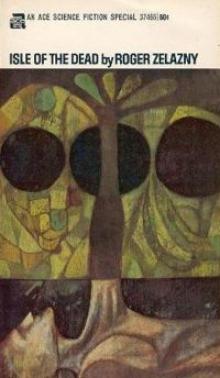 Isle Of The Dead
Isle Of The Dead Salesman Tale (amber stories)
Salesman Tale (amber stories) Dismal Light
Dismal Light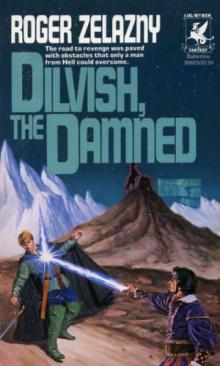 Dilvish, The Damned
Dilvish, The Damned The Black Throne
The Black Throne Wizard World 2: Madwand
Wizard World 2: Madwand The Salesman's Tale
The Salesman's Tale